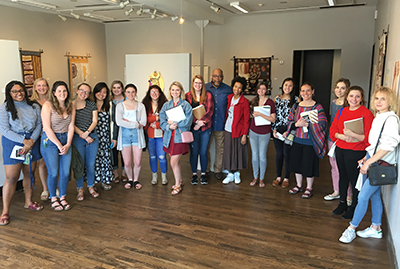 Menu
Menu



Assistant Professor of Human and Social Sciences Carla Pezzia, Ph.D., and Associate Professor and Chair of Economics Tammy Leonard, Ph.D., have received a federal grant for $250,000 to support their research on food insecurity among the senior citizens in our community and what can be done to help. Their work will be supported with a research contract from the University of Kentucky Center for Poverty Research through funding by the U.S. Department of Agriculture, Food and Nutrition Service.
Specifically, the grant builds upon Leonard’s work with Crossroads Community Services, recruiting participants from this organization’s central location, its partner distributing sites, and Catholic Charities’ senior services program in Dallas County. Pezzia and Leonard will divide the participants, all seniors, into four groups: those who are food insecure and live by themselves; those who are food insecure and live with a spouse or other seniors; those who are food insecure and live in a multigenerational household; and those who are not currently food insecure, but do receive meal services, and reside in a variety of household settings.
“With this research, we are hoping to shine a light on issues related to food, health and economic insecurity among older adults — a demographic that experiences unique challenges that often get overlooked in the literature,” said Pezzia. “By focusing on the life course of older adults, we also hope to note patterns during childhood and early adulthood that may help inform prevention measures. We are honored to be able to assist our partner organizations in their efforts to alleviate the suffering of some of the most vulnerable in our community.”
Pezzia and Leonard will spearhead different elements of the research plan based on their individual expertise. Pezzia will first interview all participants to collect their life histories. After transcribing the interviews, she will conduct inductive analysis of life history interviews with the seniors to provide in-depth descriptions of household characteristics. Next, Pezzia will follow up with content (deductive) analysis of the life history interviews to determine what combination(s) of individual/household characteristics ameliorate or exacerbate the likelihood of food insecurity. Finally, Leonard will perform descriptive and bivariate analyses of structured questionnaires to examine the monthly impact of food insecurity and quality of life among seniors.
Pezzia’s and Leonard’s established relationships with Crossroads Community Services and Catholic Charities Dallas provide them with access to a wide variety of potential participants. Both organizations have already agreed to help support the professors’ recruitment efforts by promoting the study to their clients and giving Pezzia and Leonard access to office space for conducting interviews and so on.
“The beauty of a mixed methods project like ours is that it gives us the opportunity to speak to multiple audiences, from those who want to see the ‘big picture’ through our quantitative analyses to those who want to understand individual experience from the qualitative data,” said Pezzia. “While our more directed questions allow for analyses of complex interactions between individual experience and societal context, the life history approach we are using also gives participants an opportunity to tell their life story as they want to tell it, helping to give voice to groups of people who are often systemically silenced or ignored.”
Questions asked in these interviews aim to assess quality of life, food insecurity, and well-being, come from standardized assessment tools, and include the following:
Pezzia and Leonard hope to begin data collection by late April or as soon as possible given the current public health crisis. Their initial recruitment with life history interviews will take approximately six months; they will begin analyzing data transcripts immediately after completing the initial interviews. They expect this analysis to be completed by April 2021, in time for the grant’s Progress Report Conference. Analysis for their second objective will follow, to be completed by September 2021. The final analyses of survey data will begin in September 2021, with the remainder of the research period spent on preparing the final report and article for submission (both to be completed by February 2022, with other articles to follow), as well as preparing for the research symposia in August 2022.
The grant budget includes funding for a postdoctoral fellow to help analyze the research data and develop reports and publications; Pezzia and Leonard hope to have someone for the second year of the project.
“Our goal is to find someone who is an economic anthropologist and can speak to both disciplines that inform the project,” explained Pezzia. “We are hopeful they will also be able to bring their expertise to the classroom and perhaps teach a class or two.”
While time constraints and the intensity of the data collection will not allow for students to be involved in the project initially, there will be plenty of opportunities later for students to help with data cleaning and some preliminary analyses. While the project was designed with specific primary analyses in mind, Pezzia says that they already have ideas for secondary data analyses to which it would be suitable for students to contribute for future publications.
“This new funding provides an opportunity to benefit UD as a whole through greater cross-disciplinary connectivity,” said Leonard. “We encourage interested students to actively participate in our monthly CARE Learning Community meetings so that they can begin to learn about our project and other work being done at UD that impacts the community.”
She advised that the CARE Learning Community typically meets the second Tuesday of the month when classes are in session.
“We are very grateful for this opportunity to expand and build upon the work various CARE researchers have done in the DFW community,” added Leonard. “It’s extremely encouraging to experience the interest that our nonprofit partners have in this work because at the end of the day, it’s the work that they do that will ultimately give life to the research for the benefit of seniors in our community. I’d also like to note that this project is really the brainchild of Dr. Pezzia, and I’m extremely thankful for the collaboration and expertise she brings to the project. Oftentimes research gets siloed in a single discipline or method. The collaboration on this project, I hope, will be an example of how much more we can learn if we are willing to break through traditional disciplinary boundaries.”
This grant marks the third federal grant received by UD and its faculty this school year. Assistant Professor of Physics Will Flanagan, Ph.D., was recently awarded a $450,000 contract from the Air Force for his work in developing the world’s smallest neutron detector. In October, the rigor of UD’s politics doctoral program led the U.S. Department of Education to award UD a $250,405 grant for stipend support for politics doctoral students through its Graduate Assistance in Areas of National Need program (GAANN).
Discover more about the Economics Department, the Human and Social Sciences Department, and CARE at UD.